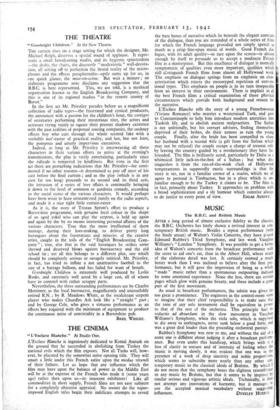THE CINEMA
" L'Esclave Blanche:" At Studio One.
L'Esclave Blanche is ingeniously dedicated to Kemal Ataturk on the ground that he succeeded in abolishing from Turkey the national evils which the film exposes. Not all Turks will, how- ever, be placated by the somewhat naive opening title. They will smart a little under this French satire upon the modus vivendi of their fathers. Let us hope that any influence which the film may have upon the balance of power in the Middle East will be at the expense of the French who made it (some years ago) rather than upon us—its innocent exhibitors! Like all commodities in short supply, French films are not easy subjects for a completely objective appraisal. No sooner do the super- imposed English titles begin their indelicate attempts to reveal
the bare bones of narrative which lie beneath the elegant contours of the dialogue, than you are reminded of a whole series of films for which the French language provided not simply speech so much as a crisp fine-spun music of words. Good French dia- logue, with its adult quality—so rare upon the screen—is almost enough by itself to persuade us to accept a mediocre French film as a masterpiece. But this excellence of dialogue is normally symptomatic of qualities even more important, qualities which still distinguish French films from almost all Hollywood work The emphasis on dialogue springs from an emphasis on char- acterisation which rejects the stereotyped repetition of conven- tional types. This emphasis on people is in its turn inseparable from an interest in their environment. There is implicit in all the best French films a critical examination of those physical circumstances which provide both background and reason for the narrative.
L'Esclave Blanche tells the story of a young Frenchwoman (Viviane Romance) who marries a westernised Turk, and goes to Constantinople to help him introduce modern amenities into Turkish life, and to abolish ancient malpractices. The Sultan is not unfriendly, but his corrupt advisers, finding themselves deprived of their bribes, do their utmost to ruin the young
couple. Finally, after the bride has been 'comPelled to share her husband with a second Wife (a gift from the Sultan which may not be refused) the couple escape a charge of treason only by leaving the country guided by a revolutionary they have be- friended. The film is brilliantly acted, particularly by Dalio as a Whimsical little jack-in-the-box of a Sultan ; but what dis- tinguishes it from the run-of-the-week clash of Hollywood temperaments in supposedly exotic surroundings is that the story is set, not in a familiar corner of a studio, which we all agree to pretend is Timbuctoo, but in a place which is un- familiar enough to be the Turkey it claims to be. The film is, in fact, primarily about Turkey. It approaches its problem with a broad sophistication and a sly humour which contrive always
to do justice to every point of view. EDGAR ANSTEY.


























 Previous page
Previous page